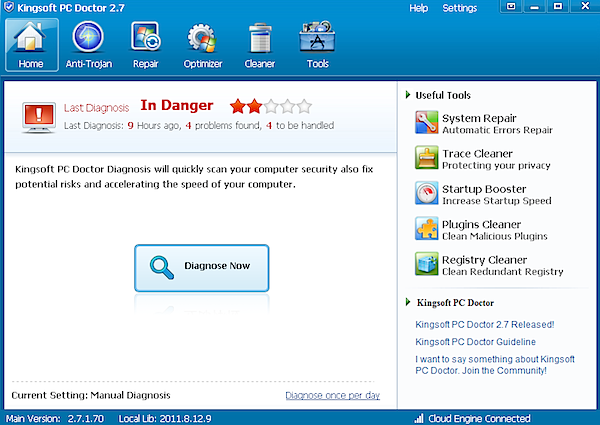PC Doctor: Better at system surgery than diagnosis

The PC world is packed with tools that promise to optimize your system, but most do little or nothing useful. And so the news that Kingsoft Security had released another, their free PC Doctor, didn't exactly fill us with anticipation.
The reality was much better than we expected, though. PC Doctor is far more interesting than most of the competition, and while the program is currently flawed, it could already be useful for many people.
If you're looking to clean up your hard drive, for instance, then PC Doctor has plenty to offer. It can clear the tracks of all the main browsers (IE, Firefox, Chrome, Opera, Safari); uncovered more junk files than CCleaner on our test PC; wipes application and Windows histories; highlights Windows files that can be deleted (sample music, pictures, videos and so on); and lists the largest 100 files on your system drive for a quick look at where all your space has gone.
The Optimizer section is similarly thorough. Not only does it display all your startup programs, Windows services and scheduled tasks, but PC Doctor also provides advice on which ones should be disabled. And by default, every time your system starts, PC Doctor displays its boot time, so you can see if your tweaks have had effect (as well as spotting when some other system change has started to slow you down).
Useful extras include a Traffic Monitor, which displays your currently open Internet connections. And a more general system monitor displays your current Internet connection activity (upload and download speeds), as well as tracking which programs are hogging the most RAM, CPU time and network bandwidth.
PC Doctor is rather less successful with its security tools, unfortunately. An Anti-Trojan module aims to detect malware, for instance, but all it did on our test system was produce a very long list of false positives. And it was much the same story with the Plugins Cleaner, which checks your browser plugins for threats: it claimed that every one of our plugins was "dangerous", even though most of these were very standard (Java, Adobe's PDF Helper, and so on).
The "Repair" module was also disappointing. It's supposed to check your PC for missing Windows patches, which in theory is a good idea. In practice, though, it ignored updates that were relevant for our system, while presenting us with others that really weren't (a patch aimed at web servers, an "update to support the new currency symbol for the Indian Rupee", and more).
And there are presentation issues throughout the program and its website. The English translation is particularly poor, for example, and there is no real help; clicking the Help menu just opens a browser window at the program's forum.
None of this should necessarily put you off using the program entirely. The false positives should reduce as users provide feedback, and you don't have to use them, anyway: there's plenty of additional functionality for you to explore.
Be very careful when you initially use PC Doctor, though, even with the Optimizer and Cleaner modules. Don't just blindly trust its recommendations and click the "Optimize" or "Delete" buttons right away: read the details, and make sure you approve of whatever it's going to do before you take those actions.

Pingback: Win a Free Laptop Computer » Blog Archive » PC Doctor: Better at system surgery than diagnosis